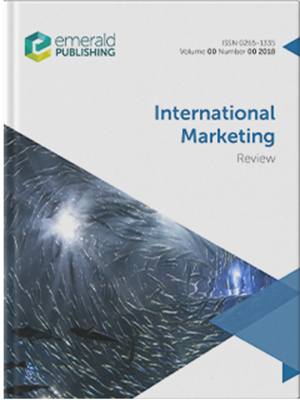COVID-19大流行期间新兴市场企业在发达市场采取的复合协作和差异化战略
IF 4.6
3区 管理学
Q1 BUSINESS
引用次数: 13
摘要
目的本文阐述了在新冠肺炎大流行期间,新兴市场出口企业如何利用基于组合的能力采取差异化战略,这反过来将使它们能够加强自己的形象和市场份额,即在先进市场的战略营销表现。设计/方法/方法本研究基于86家向发达经济体出口的巴基斯坦公司的调查数据。研究发现,组合协作能力对在发达东道国市场开展业务的新兴市场出口公司的差异化战略和战略营销绩效产生了积极影响。此外,研究结果表明,差异化战略中介了组合协作能力对这些企业战略营销绩效的影响。原创/价值通过采用一种新的基于成分的理论视角,本研究研究了新兴市场企业如何在先进的出口市场区分其产品,以在新冠肺炎疫情等外部冲击期间实现更好的战略绩效这一未充分探索的现象。鉴于出口增长是包括巴基斯坦在内的许多新兴市场的战略优先事项,因为它们存在巨大的贸易赤字,本研究从理论和实践角度提供了重要贡献。本文章由计算机程序翻译,如有差异,请以英文原文为准。
Composite collaboration and the differentiation strategies adopted by emerging market firms in advanced markets during the COVID-19 pandemic
PurposeThis article illustrates how, during the COVID-19 pandemic, emerging market exporting firms can adopt differentiation strategies using composition-based capabilities, which, in turn, will enable them to strengthen their images and market shares, i.e. their strategic marketing performance in advanced markets.Design/methodology/approachThis study is based on survey data obtained from 86 Pakistani firms exporting to advanced economies.FindingsThe study found that compositional collaboration capabilities positively influence the differentiation strategies and strategic marketing performance of emerging market exporting firms conducting business in advanced host markets. Furthermore, the findings indicate that differentiation strategies mediate the influence of compositional collaboration capabilities on the strategic marketing performance of these firms.Originality/valueBy taking a new compositional based theoretical perspective, this study examined the underexplored phenomenon of how emerging market firms can differentiate their offerings in advanced export markets in order to achieve a better strategic performance during external shocks such as the COVID-19 pandemic. Given that export growth is a strategic priority for many emerging markets, including Pakistan, due to their substantial trade deficits, this study provides important contributions from both the theoretical and practical perspectives.
求助全文
通过发布文献求助,成功后即可免费获取论文全文。
去求助
来源期刊

International Marketing Review
BUSINESS-
CiteScore
8.70
自引率
12.00%
发文量
55
期刊介绍:
International Marketing Review (IMR) is a journal that has, as its core remit, the goal of publishing research that pushes back the boundaries of international marketing knowledge. IMR does this by publishing novel research ideas, and by publishing papers that add substance to, question the basic assumptions of, reframe, or otherwise shape what we think we know within in the international marketing field. IMR is pluralistic, publishing papers that are conceptual, quantitative-empirical, or qualitative-empirical. At IMR, we aim to be a journal that recognizes great papers and great research ideas, and works hard with authors to nurture those ideas through to publication. We aim to be a journal that is proactive in developing the research agenda in international marketing, by identifying critical research issues, and promoting research within those areas. Finally, IMR is a journal that is comfortable exploring, and that fosters the exploration of, the interfaces and overlaps between international marketing and other business disciplines. Where no interfaces or overlaps exist, IMR will be a journal that is ready to create them. IMR’s definition of international marketing is purposefully broad and includes, although is not restricted to: -International market entry decisions and relationships; -Export marketing and supply chain issues; -International retailing; -International channel management; -Consumer ethnocentrism, country and product image and origin effects; -Cultural considerations in international marketing; -International marketing strategy; -Aspects of international marketing management such as international branding, advertising and new product development.
 求助内容:
求助内容: 应助结果提醒方式:
应助结果提醒方式:


